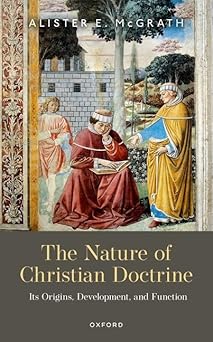
The Nature of Christian Doctrine: Its Origins, Development, and Function
by: Alister E. McGrath (Author)
Publisher: Oxford University Press
Publication Date: 2024/5/1
Language: English
Print Length: 224 pages
ISBN-10: 0198901445
ISBN-13: 9780198901440
Book Description
A groundbreaking account of the origins, development, and enduring significance of Christian doctrine, explaining why it remains essential to the life of Christian communities. Noting important parallels between the development of scientific theories and Christian doctrine, Alister E. McGrath examines the growing view of early Christianity as a ‘theological laboratory’. We can think of doctrinal formulations as proposals submitted for testing across the Christian world, rather than as static accounts of orthodoxy. This approach fits the available evidence much better than theories of suppressed early orthodoxies and reinforces the importance of debate within the churches as a vital means of testing doctrinal formulations. McGrath offers a robust critique of George Lindbeck’s still-influential Nature of Doctrine (1984), raising significant concerns about its reductionist approach. He instead provides a more reliable account of the myriad functions of doctrine, utilising Mary Midgley’s concept of ‘mapping’ as a means of coordinating the multiple aspects of complex phenomena. McGrath’s approach also employs Karl Popper’s ‘Three Worlds’, allowing the theoretical, objective, and subjective aspects of doctrine to be seen as essential and interconnected. We see how Christian doctrine offers ontological disclosure about the nature of reality, while at the same time providing a coordinating framework which ensures that its various aspects are seen as parts of a greater whole. Doctrine provides a framework, or standpoint, that allows theological reality to be seen and experienced in a new manner; it safeguards and articulates the core vision of reality that is essential for the proper functioning and future flourishing of Christian communities.
About the Author
A groundbreaking account of the origins, development, and enduring significance of Christian doctrine, explaining why it remains essential to the life of Christian communities. Noting important parallels between the development of scientific theories and Christian doctrine, Alister E. McGrath examines the growing view of early Christianity as a ‘theological laboratory’. We can think of doctrinal formulations as proposals submitted for testing across the Christian world, rather than as static accounts of orthodoxy. This approach fits the available evidence much better than theories of suppressed early orthodoxies and reinforces the importance of debate within the churches as a vital means of testing doctrinal formulations. McGrath offers a robust critique of George Lindbeck’s still-influential Nature of Doctrine (1984), raising significant concerns about its reductionist approach. He instead provides a more reliable account of the myriad functions of doctrine, utilising Mary Midgley’s concept of ‘mapping’ as a means of coordinating the multiple aspects of complex phenomena. McGrath’s approach also employs Karl Popper’s ‘Three Worlds’, allowing the theoretical, objective, and subjective aspects of doctrine to be seen as essential and interconnected. We see how Christian doctrine offers ontological disclosure about the nature of reality, while at the same time providing a coordinating framework which ensures that its various aspects are seen as parts of a greater whole. Doctrine provides a framework, or standpoint, that allows theological reality to be seen and experienced in a new manner; it safeguards and articulates the core vision of reality that is essential for the proper functioning and future flourishing of Christian communities. Read more
未经允许不得转载:电子书百科大全 » The Nature of Christian Doctrine: Its Origins, Development, and Function

